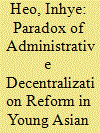|
|
|
Sort Order |
|
|
|
Items / Page
|
|
|
|
|
|
|
| Srl | Item |
| 1 |
ID:
142638


|
|
|
|
|
| Summary/Abstract |
This paper argues that Korea, once a representative East Asian developmental state, has state characteristics that amount to ‘neoliberal developmentalism’, which is a combination of the government's neoliberal political rationality and the developmental state's governmentality. To elucidate this, the case of Korea's recent green growth policymaking process is analysed. The government based the policy on its neoliberal political rationality. This featured the utilisation of neoliberalism to achieve the government's specific aims in the international, political and socio-economic spheres. Furthermore, the government revealed the developmental state's governmentality, focusing on the maintenance of the developmental state's policy autonomy and capacity. Based on the findings, this paper teases out the academic implications of the post-developmental state and the policy implications regarding policymaking in the context of neoliberal developmentalism.
|
|
|
|
|
|
|
|
|
|
|
|
|
|
|
|
| 2 |
ID:
163915


|
|
|
|
|
| Summary/Abstract |
It is generally perceived that administrative decentralization reform in young democracies is a promise to improve democracy from below. Yet, in terms of democratic development, the impact of this process is ambivalent, and can be described as a paradox of reform. This article argues that preemptive countermeasures that offset problems predicted to emerge as the reform proceeds should be formulated as part of the reform through introducing a preventive policy paradigm in the area of democratic reform policy. This is to alleviate or prevent the creation of the paradox and to contribute to democratic development through enhancing people’s satisfaction with the newly democratized government. To this end, this study examines administrative decentralization reform in South Korea and Indonesia and uncovers these reforms’ paradoxes. These two cases are particularly worthy of study, since their young democratic governments lack countermeasures against predictable reform problems, intensifying the paradox. I argue that the implications drawn from these two cases for methods of enhancing democratic development in other young democracies are worth heeding.
|
|
|
|
|
|
|
|
|
|
|
|
|
|
|
|
| 3 |
ID:
135791


|
|
|
|
|
| Summary/Abstract |
This study examines the reform trajectory of financial supervision in South Korea after the 1980s, focusing on external and internal political–economic factors. Research results indicate that the changed economic landscape led the government, which once utilized financial supervision as a tool to support industrial policy, to alter its aims and pursue the development of the financial market itself. During this transformational process, the 1997 Asian financial crisis functioned as a powerful stimulus for the reform of the previous supervisory system. The process was also marked by social actors’ efforts to affect related policies and the government’s efforts to control the reform process, as well as confrontations between organizations that supported contradictory reform plans. A multi-strategy approach including in-depth interviews with a senior staff member from a government financial regulatory agency, literature reviews, and secondary data collection, was adopted in order to enhance the validity and reliability of this paper.
|
|
|
|
|
|
|
|
|
|
|
|
|
|
|
|
| 4 |
ID:
168239


|
|
|
|
|
| Summary/Abstract |
After the democratisation of South Korea in 1987, political discourse on ‘big government’ nearly disappeared, largely because it recalled past authoritarianism. Authoritarian states are highly likely to employ ‘big government’ – exerting policy influence over the distribution of private resources – to sustain their political power, and Korea’s authoritarian state was no exception. Thus, newly inaugurated President Moon Jae-in’s official implication that he would pursue big government is notable, because he claimed to represent pro-democracy groups that opposed both historical authoritarianism and the former president’s undemocratic governance. In this context, this study examines external and internal political-economic factors behind the revival of big government discourse in Korea. Results show that critical factors included the lack of pressure in the global capitalist market and the dominance of governmentalists over marketists in the political-economic discourse influencing the administration’s maintenance and expansion of its political foundation.
|
|
|
|
|
|
|
|
|
|
|
|
|
|
|
|
|
|
|
|
|